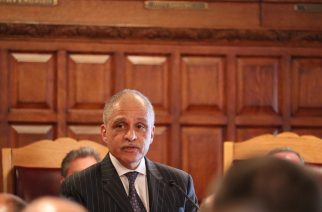
Food pantries are struggling to feed hungry New Yorkers as more people have come to rely on their services in recent weeks, even as volunteers, funding, and food donations are becoming more scarce.
New York City Mayor Bill de Blasio announced last week a $170 million plan to feed New Yorkers as city food banks declared a state of emergence due to the high demand amid the pandemic.
“We won’t let anyone go hungry in the greatest city in the world,” said de Blasio in his COVID-19 Feeding New York Plan.
According to New York City Department of Sanitation Commissioner and appointed COVID-19 Food Czar, Kathryn Garcia, there were 1.2 million people in New York City struggling with food insecurity before the virus took its toll on the city.
More than 250,000 people have tested positive for the coronavirus in the state, with 142,432 cases in New York City alone as of Wednesday.
The federal Coronavirus Aid, Relief, and Economic Security Act (CARES Act) provided a $1,200 emergency check to many New Yorkers, thousands of who are now unemployed needing the money for rent, utilities, other living costs yet alone food.
Along with de Blasio’s Feeding New York Plan, the City announced on April 10, $25 million in funding for emergency food providers experiencing heightened demand and increased costs.
New York City Mission Society board member and socialite Jean Shafiroff believes that the 800 food pantries in the City still face challenges of obtaining and managing food supply as they lose staff to COVID-19 related fears and illness.
“The food supply is not getting to the food pantries the way it should,” said Shafiroff.“That is because the demand across the country is so great.”
Nearly one-third of the food pantries in the New York-metropolitan region have shut down, leaving thousands of New Yorkers without access to food.
“I can’t imagine what it must be like to have children at the table with no food,” Shafiroff said.
Food Bank for New York City, one of the biggest food banks in the city, has provided over 5 million meals since the outbreak started. But the line of getting into the food pantry circles around the block every day, furthering risking the health of those not able to stay home.
Feeding America, the largest food pantry in the country, estimated $1.4 billion needed for the next six months to feed the people in need, knowing the one-time stimulus check will not be enough for many New Yorkers.
Around 60 percent of Feeding America volunteers nationwide have dropped out from fear of exposure to the virus or furthering its spread, with a majority of those who volunteer being the elderly and schools.
The $170 million plan to help food shortages, will also go towards building two rest stops for the truck drivers who deliver food supply to the city, additional wages, personal protective equipment for food industry employees and overall increase food delivery to New Yorkers in need.
To individually help food banks and pantries, Shafiroff is writing checks to the food banks and hospitals every month, and recommends donating money or canned food if possible.









